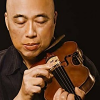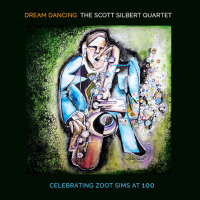Home » Jazz Articles » Jason Kao Hwang
Jazz Articles about Jason Kao Hwang
About Jason Kao Hwang
Instrument: Composer / conductor
Jason Kao Hwang: Human Rites Trio

by Mike Jurkovic
Chattering dances. That's the first image that springs to mind when encountering Human Rites Trio, the fascinating new music from prolific violinist/composer Jason Kao Hwang and his rhythmic, shapeshifting compatriots, drummer Andrew Drury and bassist Ken Filiano. Building on a freneticism all their own, the opening two-part suite “Words Asleep Spoken Awake" is a hyper-active, many headed hydra of spontaneous interplay. Counterpoint groove and muscle memory all come into play with Hwang's sound moving from mournful strains to ...
Continue ReadingWilliam Parker: Migration of Silence Into and Out of the Tone World

by Giuseppe Segala
L'attività musicale di William Parker è stata copiosamente documentata da circa centocinquanta dischi, che spaziano in un caleidocopio di gruppi fondati dallo stesso contrabbassista, formazioni cooperative, omaggi, collaborazioni. Ma nessun singolo lavoro, fino a questo momento, aveva focalizzato l'attenzione su un ventaglio di ispirazioni così ampio e completo come si fa ora nei dieci CD del cofanetto The Music of William Parker—Migration of Silence Into and Out of The Tone World. In questo lavoro monumentale, che viene ...
Continue ReadingSteve Swell: The Center Will Hold

by John Sharpe
Unusual instrumentation inspires NYC-based trombonist Steve Swell to ever greater heights on the six compositions comprising The Center Will Hold. Pride of place goes to veteran drummer Andrew Cyrille, who certainly deserves the extra billing he receives on the cover. Beside him are a mixture of long time colleagues of the trombonist, violinist Jason Kao Hwang and cellist Fred Lonberg-Holm, and more recent collaborators, pianist Robert Boston, who fulfilled a leading role on Swell's accomplished Brain In A Dish (NoBusiness, ...
Continue ReadingJason Kao Hwang: Human Rites Trio

by Dan Bilawsky
Observance is at the heart of violinist Jason Kao Hwang's work, and no two musicians respect and fulfill the promise in his ritualistic art to the degree of bassist Ken Filiano and drummer Andrew Drury. The relationship between these three has traversed time and space(s), manifesting in a sea of strings for Symphony of Souls (Mulatta Records, 2011), playing to poetic notions on Lifelines (Innova Recordings, 2015), taking on a horn and harmonist in Sing House (Euonymus Records, 2017) and ...
Continue ReadingJason Kao Hwang & Karl Berger: Conjure

by Mike Jurkovic
There is an adventurer's appeal when two free thinkers just pick up mid-stream and let the river carry them. Without label or structure constraint, life-preservers and the chronic happenstance which bars so many back from reaching beyond themselves, music emerges shaded by emotional time, humor, awareness, and mutual respect for each other's untapped potential. So we have Conjure, a meeting of the minds of eighty-four year old vibraphonist/pianist Karl Berger (from the free school of Ornette Coleman, Don ...
Continue ReadingJason Kao Hwang & Karl Berger: Conjure

by Hrayr Attarian
On the ethereal and intimate Conjure, violinist Jason Kao Hwang and pianist-vibraphonist Karl Berger perform a set of eight improvised duets. Hwang was a member of Berger's Creative Music Orchestra, so the facility of their interaction is not surprising. The brilliant synergy between them, however, results in thought-provoking and thrillingly inventive music which moves with its deep lyricism. The crisp cascade of Berger's nocturnesque mallets opens the melancholic “Silhouettes." Hwang goes from pizzicato punctuations to eerily bent notes ...
Continue ReadingJason Kao Hwang & Burning Bridge: Blood

by John Sharpe
As the follow-up to his Burning Bridge octet's eponymous debut (Innova, 2012), violinist Jason Kao Hwang has created another ambitious and wide-ranging work. As befits the title Blood, it constitutes a personal meditation on weighty subject matter, precipitated by a narrowly-avoided car accident which caused Hwang to consider the wartime experiences of his mother in China. The result is a complex, but gripping, continuous ensemble performance of what the liner notes call “28 staged scenes," tracked in ...
Continue Reading

















